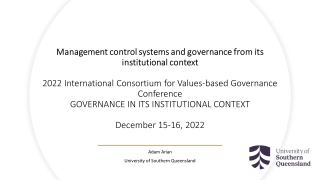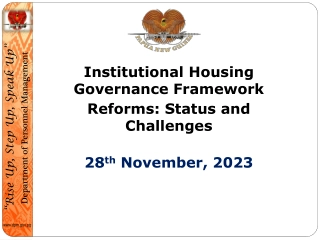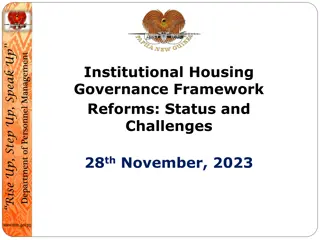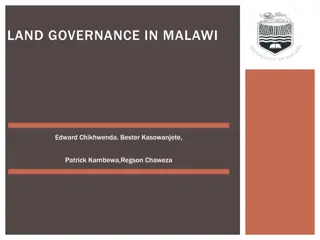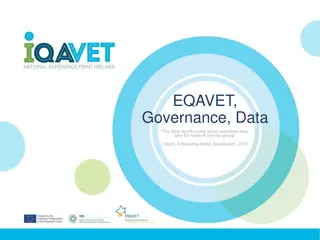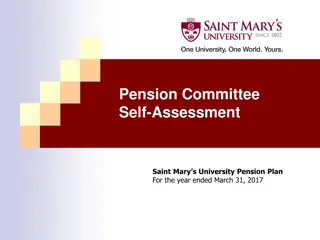INSTITUTIONAL GOVERNANCE FRAMEWORK
Currently, there is a lack of formal structure in the Institutional Housing Governance Framework (IHGF) within the public service system, leading to inefficiencies in managing institutional housing policies. This absence has resulted in deteriorating state assets, unmet housing demands, and ineffective allocation strategies. Establishing an IHGF is crucial to prudently manage institutional housing among government departments and agencies to enhance service delivery at national and subnational levels.
Download Presentation

Please find below an Image/Link to download the presentation.
The content on the website is provided AS IS for your information and personal use only. It may not be sold, licensed, or shared on other websites without obtaining consent from the author.If you encounter any issues during the download, it is possible that the publisher has removed the file from their server.
You are allowed to download the files provided on this website for personal or commercial use, subject to the condition that they are used lawfully. All files are the property of their respective owners.
The content on the website is provided AS IS for your information and personal use only. It may not be sold, licensed, or shared on other websites without obtaining consent from the author.
E N D
Presentation Transcript
INSTITUTIONAL GOVERNANCE FRAMEWORK Dr Lindsay P. Kutan Senior Research Fellow & Program Leader NATIONAL RESEARCH INSTITUTE APEC HAUS, PORT MORESBY 28 NOVEMBER 2023 Name of presenter Name of presenters Inquire Inform Influence
INSTITUTIONAL HOUSING GOVERNANCE INSTITUTIONAL HOUSING GOVERNANCE FRAMEWORK FRAMEWORK DRAFT_ ONE (1) DRAFT_ ONE (1)
Institutional Housing Governance Framework OVERVIEW PURPOSE SCOPE PRINCIPLES ORGANISATION PLANNING ROLES AND RESPONSIBILITIES RISK AUDIT AND SECURITY ENVIRONMENT
Overview Currently, within the Public Service system, there is no formal structure of Institutional Housing Governance Framework (IHGF) in place to ensure good governance practices apply in the implementation and management of institutional housing policy directives. In the existing structure, provision and administration of Institutional Housing has been devolved to various Government departments and agencies. This arrangement creates a vacuum and encourages government agencies to work in silos with no proper management systems.
OverviewContinue Consequently, these state assets: have deteriorated to the extent that many institutional houses are unfit for human habitation due to lack of maintenance; have retrenched officers prolonging their stay and residing unlawfully; have extended family members sharing the accommodation; are inadequate to cater for increase demand as the available supply of housing stock are not there; and is allocated without any real strategic evaluation of need being conducted.
Purpose Institutional Housing Governance Framework simply defines the systems and processes that prudently manage, control and direct the use of institutional housing among various government departments and agencies for the common goal of efficiently and effectively delivering government services within the national and subnational levels. There is a need to establish an Institutional Housing Governance Framework (IHGF) that will provide guidelines in the systems and processes on management and administration of institutional houses.
Scope IHGF applies to: all institutional houses owned by the State through its departments and agencies; any institutional housing projects intended to roll out new houses to the public service; and any state sponsored/ financed housing projects.
Objectives To ensure that there is housing for all public servants serving the country in various levels of government system; To ensure that there is fair distribution of housing to all public servants; To ensure that there is proper management of housing stock and new developments; Establishment of a central database system that will store all the relevant institutional housing information. To ensure that demand and supply do not out strip each other and there must be equilibrium levels maintained at all times.
Principles Fairness Accountability Transparency Integrity Stewardship Efficiency Leadership
Organisationalplanning There is no central agency that is responsible for making such assessments. Consequently, institutional housing allocations has resulted in skewed priorities with high tendency of misallocation or wastage of public funds. decentralisation of Under the IHGF, there needs to be a much greater focus of the provision of institutional housing, consistent with operational need, and some oversight to ensure funding allocated for institutional housing is used as originally planned.
Organisationalplanning Key drivers Key drivers Overall management of IHGF by DPM. Coordination of institutional housing budgets for various departments and agencies by DPM and continued management by State agencies. Continued management by State departments and agencies with DPM providing the advisory role during the budgetary preparations.
Roles and Responsibilities DPM needs to take the lead role in the development of a revised institutional housing management strategy. It needs to liaise with line agencies regarding their views on options for a revised institutional housing management strategy and to prepare the necessary NEC submission for changes. In this role, DPM has to be staffed by people with requisite estate and property management, valuation building and architectural experience. A clearly defined matrix on the roles and responsibilities of all staff in DPM and other departments and agencies is needed.
Systems DPM needs to be involved in: DPM needs to be involved in: determining priority areas for new infrastructure developments; establishing an asset register and central database to capture all institutional houses and land; and focusing on a wholesale maintenance priority for institutional houses that have deteriorated.
Systems Developments Developments of of new Once the projects are scoped, DPM needs to have a role in determining how the project will be implemented. For small-scale maintenance and infrastructure, development funding may be provided directly to line agencies to manage or to end users to implement. For large-scale projects, DPM may develop tenders and invite responses through the Central Supply and Tenders Board, or Provincial Tenders Board as appropriate. Alternatively, the process might Governments. Another option is to engage a organisation, for instance, the PNG Incentive Fund which will be responsible for project management and delivery of large-scale projects. new institutional institutional housing housing infrastructure infrastructure be managed by the Provincial reputable project management
Summary Public Service Housing Policy and related policies are culmination of past policy initiatives aimed to provide housing in the public service over the last 45 + years. Housing policy reforms undertaken through an ad hoc and piecemeal approach has failed resulting in a dismal housing sector. Critical need for the development of a PSHP & DPSHP with a holistic approach and embedded in an IHGF. This stakeholder workshop and the up coming regional consultations provide an opportunity for relevant stakeholders to contribute to the development of these critical policies.
Insanity is doing the same thing over and over and expecting different results. Albert Einstein (1879-1955)

 undefined
undefined







